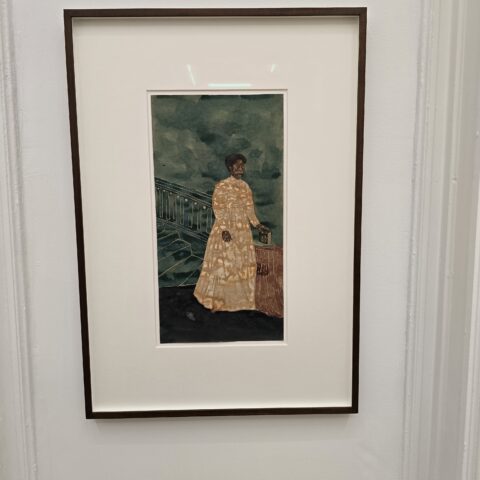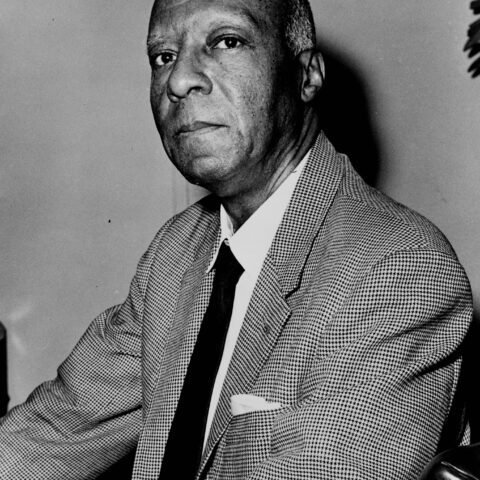Reviewed By Mark Anthony Neal | @NewBlackMan | With thanks to NewBlackMan (in Exile)
Monday, 12 October 2015.
On stage at Page Auditorium on Duke University’s campus, Gregory Porter was a gracious leader, gregarious even with his interactions with a crowd that would give him standing ovations before the evening came to a close. Behind the generous spirit and jovial demeanor, it is easy miss how deeply political Porter’s music is.
Porter opened his set with a bouncy, earnest rendition of Donny Hathaway’s “Someday We’ll All Be Free” and closed with his own “1960 What?”—in between Porter offered commentary on the prison industrial complex, Black fatherhood, the corporate takeover of popular music, and dare I say, #AllBlackLivesMatter. That nobody felt as though they were victimized by a badly orchestrated (though exquisitely arranged) protest rally has everything to do with Porter’s deft manipulation of the archive of 20th Century Black musical idioms.
Porter’s version of “Someday We’ll All Be Free”—one of the more well known songs from an artist who had few hits and is relatively obscure among general pop audiences—found him in a hopeful mood; as hopeful perhaps as Hathaway was penning the song (with Edward Howard), as he did, with the waning moments of the Civil Rights and Black Power movements as backdrop, and Marvin Gaye’s What’s Going On as blueprint for the melodies of protest. Porter’s subtle revision of one of the song’s lyrics—“keep your manly pride” remixed as “keep your manly and womanly pride” was evidence that Porter is both aware and self reflective of the moment we are in.
Porter followed the opening tune with his own “On My Way to Harlem” from his breakthrough recording Be Good (2012). A track that one might expect Porter to open his set with, instead allowed Porter to name-drop himself into a cultural narrative that still resonates for the denizens of Classic Black—Classic American—culture. With every new male jazz singer being hailed as the new—fill in the blank—mentions of Ellington, Langston Hughes and oddly Marvin Gaye, as part of the landscape of the capital of 20th century Blackness, earns Porter some street-cred, on the streets that, for example, might take one to Jazz at Lincoln Center.
But even as Porter gestures towards his own place in that narrative–a gesture that the audience gladly affirmed–he is keenly aware that they very tradition that he stands on is being quietly eroded by the streaming music service of your choice. And Porter wasn’t afraid to connect the dots; his introduction to “Musical Genocide” (from his most recent Liquid Spirit) and mashed with The Temptations’ “Papa Was a Rolling Stone,” made clear his belief the attacks on musical tradition were veiled attacks on people who are sustained by this music.
As “Papa was a Rolling Stone” allowed Porter to delve into debates about Black fatherless–Porter and his siblings were raised by his single mother–Porter’s rendition of Nat Adderley’s 1960 classic “Work Song” was a reminder of the “changing same” that is the Prison Industrial Complex. That Porter began “Work Song” with a riff from “Berta, Berta”–a favorite of Black convict laborers in the early 20th Century–was not too fine a point about the realities of a timeless industry that is largely erected on perceptions–often based on myth–of Black criminality. And given David Guetta’s recent appropriation of “Rosie,” another convict laborer favorite, for his song “Hey Mama,” there seems to be some correlation between mass incarceration and the wholesaling of Black musical culture.
Those same perceptions get Black youth killed in what amounts to State sanctioned killings, as Porter attested to in his performance of “1960 What?” a song that gives musical side-eye to notions of social progress. While audiences can get all warm and fuzzy when Porter recalls Martin Luther King Jr.’s murder on the balcony of the Lorraine Motel–a national tragedy held at double-arms length–the unnamed Black teen-ager that gets shot dead with “three pieces of licorice” in the second verse of “1960 What?” by a police officer, was conjured by Porter two years before anyone knew the name Trayvon Martin, and four years before #Ferguson became a ground zero of a national crisis.
Still, what likely remained with audiences was the potent sweetness and swagger of Porter’s instrument. Porter and his fine band, which included pianist Chip Crawford, keep the audience grounded by weaving ballads in throughout the set. Particular standouts were his rendition of the standard “Skylark,” his duet with Crawford on “Wolfcry” and his encore performance of “Real Good Hands.”
That there were folks in the audience that were likely disappointed Porter did not perform “Be Good (Lion’s Song)” or “Holding On,” his recent collaborations with Disclosure (of Sam Smith fame), speaks volumes about Porter’s potential reach. Here’s to hoping that as he reaches wider audiences that he remains committed to the very archive that provides the freedom to sing what he sings.
Freedom in the Archive: Gregory Porter






Woh I like your blog posts, saved to bookmarks !.
I was suggested this blog via my cousin. I am not certain whether or not this publish iswritten by means of him as nobody else recognise such designated approximately myproblem. You are incredible! Thanks!
Aw, this was an incredibly nice post. Finding the time and actual effortto create a great article? but what can I say? I put things off a whole lot and never manage to get anything done.Feel free to surf to my blog: Libido Build
I really enjoyed this article. Thanks for creating it. I’ll be back to see some more.
What’s up, everything is going sound here and ofcourse everyone is sharing data, that’s in fact good, keep up writing.
Hi, all is going perfectly here and ofcourse every one is sharing information, that’sin fact good, keep up writing.
Sweet blog! I found it while surfing around on Yahoo News.Do you have any suggestions on how to get listed in Yahoo News?I’ve been trying for a while but I never seem to get there!Appreciate it
Hi! I know this is kind of off topic but I was wondering if you knew where I could locate acaptcha plugin for my comment form? I’m using the same blog platform as yours and I’m havingdifficulty finding one? Thanks a lot!
Howdy! I just would like to offer you a huge thumbs up for your excellent information you have got right here on this post. I am returning to your blog for more soon.
Very nice post and straight to the point. I am not sure if this is truly the best place to ask but do you folks have any thoughts on where to employ some professional writers? Thank you 🙂
Appreciate you sharing, great article post.Thanks Again. Fantastic.
Major thanks for the blog. Cool.
Major thanks for the article.Thanks Again. Awesome.
Major thanks for the article.Really thank you! Great.
Thanks so much for the blog.Thanks Again. Really Cool.
Very informative post. Much thanks again. Really Great. Kessia Malchy Maddy
Very informative blog article. Great.
Thanks for the article.Thanks Again. Fantastic.
I quite like reading through a post that will make men and women think. Also, thank you for allowing me to comment!
I do trust all of the concepts you have offered for your post. They are very convincing and can certainly work. Still, the posts are very short for novices. May you please prolong them a bit from subsequent time? Thanks for the post.
I really like it whenever people get together and share opinions. Great blog, keep it up!
Really enjoyed this article post.Really thank you! Cool.
Thank you for your blog post.Much thanks again. Fantastic.
Thanks so much for the article.Much thanks again. Will read on…
adult personals freelocal girla near me personals
Fine way of explaining, and fastidious paragraph to take facts regarding my presentation subject, which i am going to convey in school.
order tadalafil: order tadalafil – tadalafilventolin pharmacy australia
I like what you guys are usually up too. This type of clever work and reporting!Keep up the fantastic works guys I’ve incorporated you guys to blogroll.
bimatoprost acid bimatoprost ophthalmic careprost china
Wow plenty of useful knowledge.essay writing classes styles of writing essays professional writing company
Nice respond in return of this issue with genuine arguments and explaining allabout that.My blog post — man boobs
Thanks in favor of sharing such a good opinion, piece of writing is nice, thats whyi have read it completely
Hello! I know this is kinda off topic but I was wondering if youknew where I could find a captcha plugin for my comment form?I’m using the same blog platform as yours and I’m having trouble finding one?Thanks a lot!
Aw, this was a really nice post. Finding the time and actual effort tocreate a really good article… but what can I say… I procrastinate a lot and don’t manage to get anything done.
Very neat blog.Really thank you! Cool.
Really appreciate you sharing this blog.Much thanks again. Keep writing.
Hi there! I know this is kinda off topic but I was wondering if youknew where I could locate a captcha plugin for my comment form?I’m using the same blog platform as yours and I’m having difficulty finding one?Thanks a lot!
Heya i am for the primary time here. I came across this boardand I in finding It really useful & it helped me out much.I’m hoping to provide something back and aidothers such as you aided me.